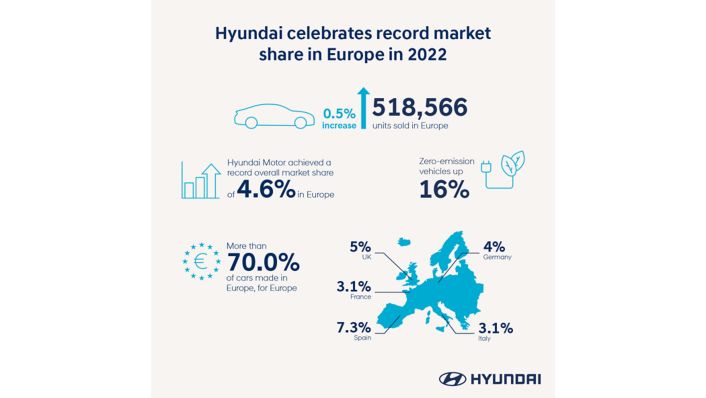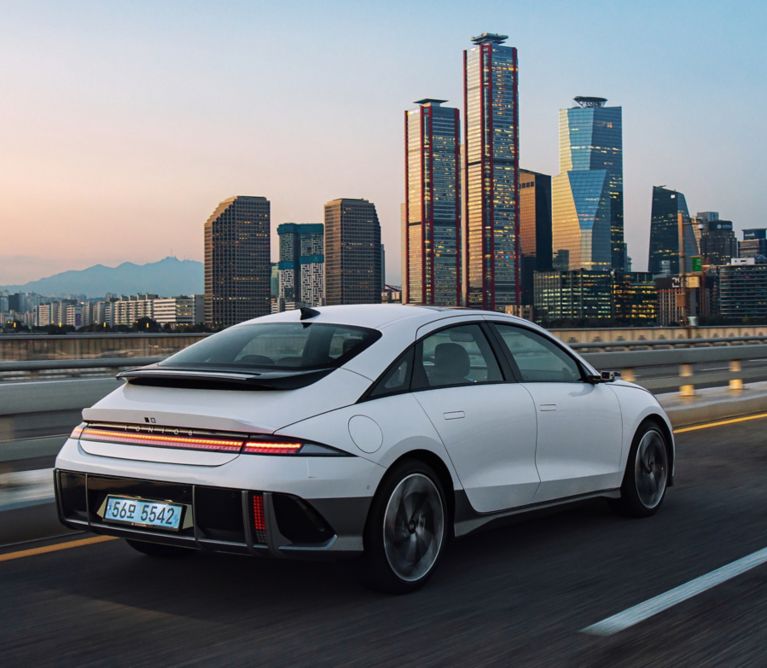- Hyundai Motor sold 518,566 units in Europe in 2022, with record market share of 4.6 per cent
- Compared to previous year, sales of zero emission vehicles in Europe are up 19 per cent
- Company achieved record market shares in Spain, France, and the UK
Press material
-
Download
-
Images
In a year marked by uncertainty, Hyundai Motor has continued to improve its standing across Europe. The company was able to overcome industry-wide obstacles with strong sales results. Hyundai concluded its 2022 European sales with impressive figures, selling 518,566 units, an increase of 0.5 per cent over 2021. Over the year, Hyundai was able to achieve a 4.6-per cent market share in Europe.
For comparison, Hyundai’s 2022 global sales totalled 3.94 million units, up 1.4 per cent year-on-year. Increasingly driven by the demand for EVs, the company also saw a rise of 19 per cent in sales of zero emission vehicles. Additionally, market shares continued to grow, with record performances in Germany, Spain, Italy, France, and the UK.

2022 has been a year of many challenges, but it has also been a year of many successes. I am confident that the momentum we’ve garnered in 2022, especially regarding electrification and zero-emission technology, will continue to carry us through 2023 and beyond. Hyundai aims to sell 4.32 million units in overseas markets. Thanks to our customer-centric focus, including our line-up, sales, and service, I am certain sales in Europe will make a substantial contribution to that.
Record-breaking market performance
Record market share increases in Europe were supported by improved standings in all of Hyundai’s ‘G5’ markets: Germany, Spain, Italy, France, and the UK. Sales in 2022 were up on the previous year, with record market share of 4.6 per cent in EU, EFTA and UK.
Hyundai models accounted for 4 per cent of all cars sold in Germany. This figure represents 105,074 new vehicle registrations in the country. Concerning EV Sales, Hyundai was ranked third in the market.
Meantime, Hyundai also reached a record market share of 7.3 per cent in Spain. This figure amounts to 59,503 newly registered vehicles.
In Italy, Hyundai’s market share reached 3.1 per cent in 2022. 41,017 new Hyundai vehicles were sold in the country.
Meanwhile, in France, Hyundai achieved a market share of 3.1 per cent. Sales were also up 4.1 per cent compared to the previous year, with a total of 44,106 new Hyundai vehicles registered in the country.
The UK market also saw significant success for Hyundai. The company sold 80,419 units, which represented a market share of 5 per cent – its highest in the UK to date. Year-on-year sales increased by 15 per cent.
On the road to electrification
Hyundai also continued on the path of zero emission mobility based on its vision of ‘Progress for Humanity’. In 2022, EVs and electrified models made up a bigger proportion of sales than ever before. Over 16 per cent of units sold featured a zero emission powertrain. Eco-friendly car range including PHEV and HEV models amount at 39.8 per cent.
Last year was also the first full year of sales for Hyundai’s debut IONIQ sub-brand model, IONIQ 5. Not only did the stylish CUV sell 38,970 units, but it also brought come awards from all over the world. Among its many accolades were the titles ‘World Car of the Year’, ‘World Electric Vehicle of the Year’, ‘World Car Design of the Year’, as well as a variety of other ‘Car of the Year’ awards.
2022 also marked a milestone for the continuation of IONIQ, Hyundai’s EV line-up brand. The world was introduced to Hyundai’s brand-new IONIQ 6 Electrified Streamliner. Having begun production for Europe late last year, the functionally aesthetic BEV will reach dealers starting in the first quarter of 2023. Together, IONIQ 5 and IONIQ 6 recorded more than 100,000 units of global sales in 2022.
Hyundai also introduced its vision for the future of performance vehicles in 2022. With the RN22e and the N Vision 74, the company showcased the future of Hyundai N vehicles. The electrified ‘rolling labs’, unveiled in July, test and verify Hyundai’s advanced technologies for use in future production models. RN22e maximises performance on the company’s Electric-Global Modular Platform (E-GMP) while featuring IONIQ 6’s streamlined body design. N Vision 74 deploys high-performance hybrid fuel cell technology, wrapped in a body heavily inspired by the 2015 Hyundai N 2025 Vision Gran Turismo and the 1974 Hyundai Pony Coupe Concept. Both models offer a glimpse into Hyundai N’s ambitions for high-performance electrification and demonstrate the company’s vision for becoming a leader in a zero-emission future.
Made in Europe, for Europe
Hyundai’s strategy in Europe puts customer-centric development and production first. To cater to European customers, the company makes cars for Europe in Europe. More than 70 per cent of vehicles produced for the European market are produced at Hyundai’s HMMC and HAOS plants in the Czech Republic and Turkey, respectively. In line with its commitment to ‘Progress for Humanity’ and commitments to carbon neutrality, in 2022, HMMC became the company's first factory to purchase 100% renewable energy through renewable energy certificates. At the sustainably powered facility, more than 350,000 vehicles across every powertrain are produced annually.
Product launches for 2023
After a year of high-profile product launches, 2023 will see the launch of more Hyundai models. One such launch will be the newly unveiled second-generation KONA family, led by the all-new KONA Electric. The bold and dynamic urban-centric SUV will bring technology-led design to the entire KONA range. KONA’s four variants will have unique styling and driver experience, but the same universal architecture. With an EV, ICE, HEV, and N Line version, the all-new KONA will allow customers to experience KONA how they want.
In addition to the all-new KONA, a high-performance vehicle will join the Hyundai line-up. The IONIQ 5 N is slated to launch in 2023, rounding out Hyundai N with its first EV model. With the introduction of IONIQ 5 N, Hyundai is taking concrete steps down the road to electrification in performance models.
About ACEA
The European Automobile Manufacturers’ Association (ACEA) represents the 14 major Europe-based car, van, truck, and bus makers. ACEA works with a variety of institutional, non-governmental, research and civil society partners, as well as a number of industry associations with related interests.
Disclaimer: CO2 and emissions data
- Electricity consumption combined for the Hyundai IONIQ 5 58 kWh with 2WD in kWh/100 km: 16.7; CO2 emissions combined in g/km: 0 (WLTP)
- Electricity consumption combined for the Hyundai IONIQ 5 58 kWh with 4WD in kWh/100 km: 18.1; CO2 emissions combined in g/km: 0 (WLTP)
- Electricity consumption combined for the Hyundai IONIQ 5 77.4 kWh (19” alloy rims) with 2WD in kWh/100 km: 17.0; CO2 emissions combined in g/km: 0 (WLTP)
- Electricity consumption combined for the Hyundai IONIQ 5 77.4 kWh (20” alloy rims) with 2WD in kWh/100 km: 18.0; CO2 emissions combined in g/km: 0 (WLTP)
- Electricity consumption combined for the Hyundai IONIQ 5 77.4 kWh (19” alloy rims) with 4WD in kWh/100 km: 17.9; CO2 emissions combined in g/km: 0 (WLTP)
- Electricity consumption combined for the Hyundai IONIQ 5 77.4 kWh (20” alloy rims) with 4WD in kWh/100 km: 19.1; CO2 emissions combined in g/km: 0 (WLTP)
- Electricity consumption combined for the Hyundai IONIQ 6 53 kWh with 2WD in kWh/100 km: 13.9; CO2 emissions combined in g/km: 0 (WLTP)
- Electricity consumption combined for the Hyundai IONIQ 6 77.4 kWh (18” alloy rims) with 2WD in kWh/100 km: 14.3; CO2 emissions combined in g/km: 0 (WLTP)
- Electricity consumption combined for the Hyundai IONIQ 6 77.4 kWh (20” alloy rims) with 2WD in kWh/100 km: 16.0; CO2 emissions combined in g/km: 0 (WLTP)
- Electricity consumption combined for the Hyundai IONIQ 6 77.4 kWh (18” alloy rims) with 4WD in kWh/100 km: 15.1; CO2 emissions combined in g/km: 0 (WLTP)
- Electricity consumption combined for the Hyundai IONIQ 6 77.4 kWh (20” alloy rims) with 4WD in kWh/100 km: 16.9; CO2 emissions combined in g/km: 0 (WLTP)










